There are many details to work out when starting a retail business.
Barcode labels, inventory systems, and even SKU vs UPC are likely to be encountered when planning retail inventory management.
To select the right type of barcode as well as get a full understand about them, keep reading for more interesting information.
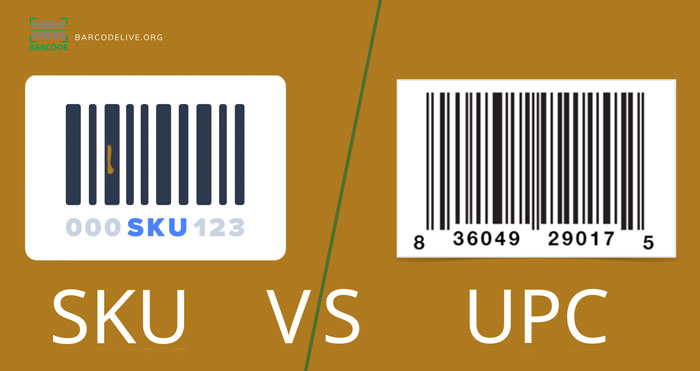
Difference between SKU vs UPC
An Overview Of A Stock-Keeping Unit (SKU)
SKUs are useful for tracking internal inventory.
SKUs typically range in length from 8 to 12 characters and contain both letters and numbers.
In essence, what is SKU?
What is an SKU?
An SKU, or "stock keeping unit," is a unique alphanumeric code that a retailer develops and allots to each of its products.
Every product (including product variations) needs to have a distinct SKU product so that the seller can readily tell one from the other.
As a result, inventory tracking and management are far more effective.
To assist shops in identifying products and keeping track of inventories, an SKU includes both numbers and letters.
Retailers can develop their own procedures and naming conventions to make SKU numbers useful for monitoring inventory as they are internal.
They can be used to specify a product's kind, color, size, style, collection, and more.
For instance, a retailer of clothing might develop an SKU naming scheme with a letter at the front to denote the sort of clothing.
They might apply the subsequent:
-
T for Top
-
B for Bottoms
-
D for Dress
-
S for Shoes
-
A for Accessory
Then taking it a step further, they might add identifying codes for gender, size, and color.
Therefore, an SKU number for a blue small men's shirt may read T1BM0322 and be coded as follows:
-
T = top
-
Sizes ranging from extra small to extra-large are as follows: 0, 1, 2, 3, and 4.
-
B = blue
-
M = men
-
0322, or the date the SKU was entered, is March 2022.
Just as an illustration.
You can develop your SKU naming scheme in a way appropriate for your company's internal workings.
Additionally, if there are any product categories, vendors, or other pieces of data you want to track, you can add IDs for them.
Retail business owners can manually create SKU sequences or use POS software that does it for them.
Popular cloud-based POS Lightspeed Retail is used by brick and mortar stores with a lot of SKUs.
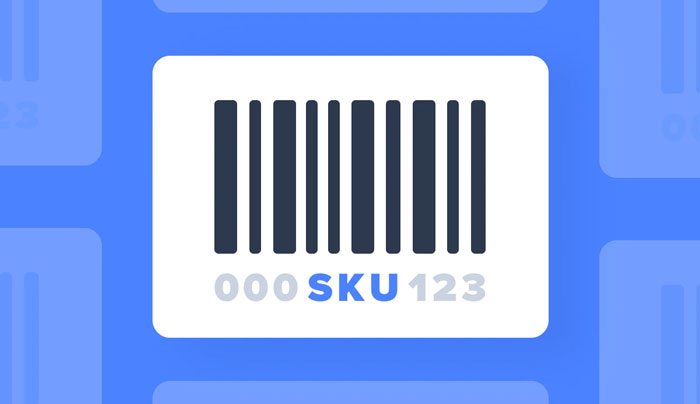
SKU
When to use an SKU?
When retailers receive products from suppliers, they should use SKU numbers.
You'll be able to maintain organization, monitor inventory, and reduce human error and data discrepancies as a result.
Additionally, a well-organized SKU numbering system might make it simpler to navigate your warehouse and inventory storage locations.
SKU numbers are also customer-facing and friendly for customers because clever online consumers may search by SKU number to locate the best purchasing possibilities.
A helpful SKU numbering system also makes it easier for employees to locate products on the sales floor, which is beneficial when customers inquire about availability.
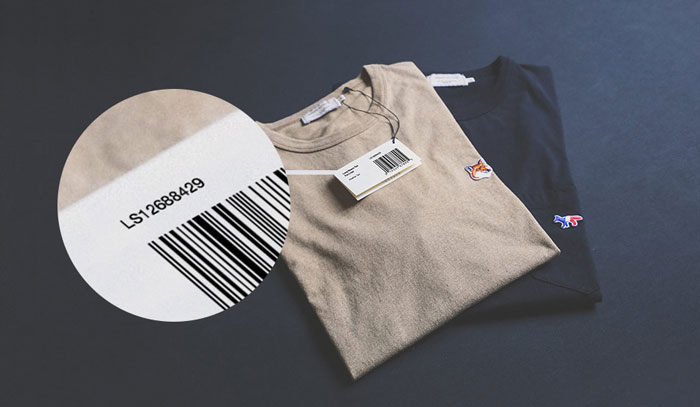
When to use an SKU?
Here are some instances where using an SKU number would be necessary:
-
Find out how many of a particular product or SKU you currently have in stock.
-
When you are unable to scan or use the barcode, conduct price checks using SKU search.
-
Track individual item shrinking
-
Ascertain whether you have more of a particular item in the warehouse, store, or elsewhere if it's out of stock.
-
Make your warehouse or stockroom organized.
-
Verify receiving to make sure you received the right amount of the goods.
-
Obtain sales reports based on SKUs.
-
Review reorder points and replenishment requirements.
-
Indicate the store or place that the item is from or at.
An Overview Of A Universal Product Code (UPC)
UPCs are used to track external supply chains. UPCs always contains 12 numbers and no letters.
To know more about UPC, keep reading.
What is UPC code?
A UPC, or Universal Product Code, is a 12-digit numeric code and accompanying barcode that is given to a product and is universally unique.
They remain the same no matter who sells the product, where it is sold, or how it is sold.
The corporate prefix, which is the first 6 to 9 digits of a UPC, indicates the corporation that is in charge of protecting the product's intellectual property. The owner of the UPC chooses the following 2–5 digits.
No two UPCs are the same since the last digit represents the sum of all the earlier digits.
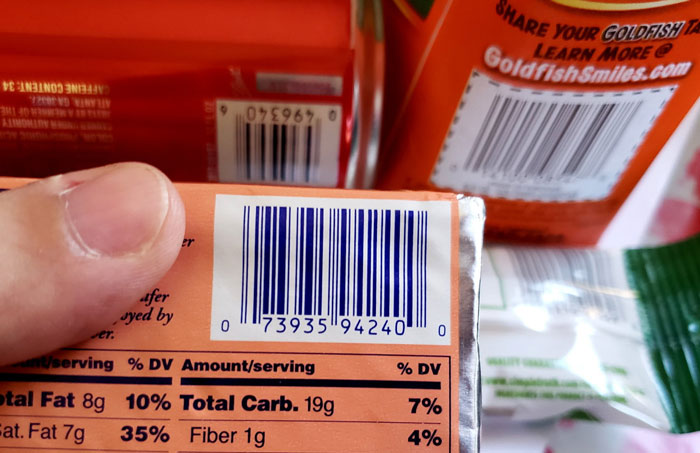
UPC
All manufacturers are required to include UPCs in their products by the Global Standard Organization (GS1), which also establishes the UPC naming guidelines.
UPCs and Global Trade Identification Numbers (GTINs) are interchangeable terms that you may also hear.
In essence, a company buys and licenses a UPC from the GS1 for each of its items.
Therefore, even if it is possible that a product won't have an SKU number, every item you buy from a provider should have a UPC on its label.
When to use a UPC?
When producing products or making them available through the global retail supply chain, you must employ UPCs.
This includes putting your products up for sale on online stores other than Amazon.
To obtain a UPC stock, you must first establish how many UPCs (or barcodes) you require via the GS1 website.
You must decide which type of UPC you wish to purchase after determining how many you require.
Smaller companies can choose the GS1 US GTIN.
But larger merchants with sizable or expanding inventories may pay more and apply for a GS1 Company Prefix, which enables them to receive numerous barcodes at once.
If you have more than nine products, GS1 advises choosing the latter.
The GS1 Company Prefix has a different pricing structure than the GS1 US GTIN, which has a $30 cost.
When selling your products in the worldwide supply chain, UPCs should always be utilized because they rarely change.
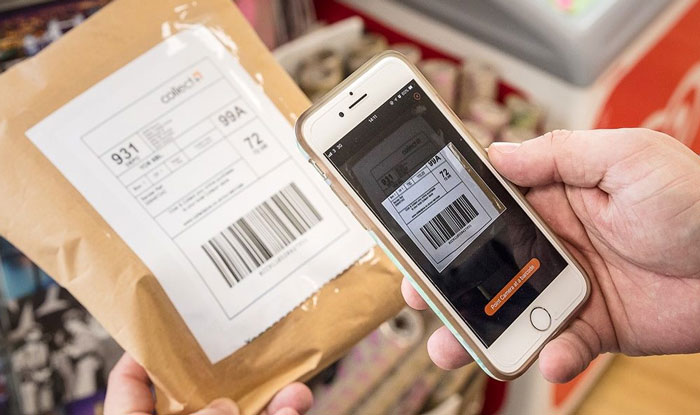
When to use a UPC?
SKU vs UPC: What Are The Differences?
Because both SKUs and UPCs act as product identifiers, they are frequently used interchangeably.
SKUs and UPCs are not equivalent, though.
The main distinctions between the two are listed below.
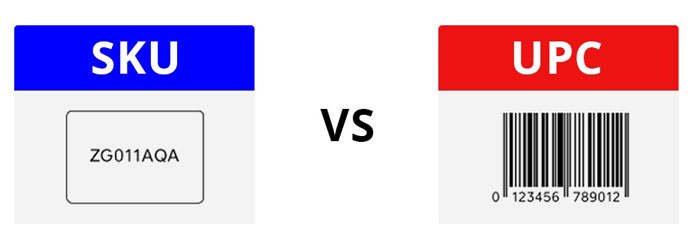
SKU vs UPC
Creator
Every business develops its own SKUs in accordance with guidelines and reasoning that make sense to those in charge of overseeing the inventory in that business.
GS1 develops UPCs in accordance with its predetermined guidelines.
A business must apply for and acquire a licensed UPC from GS1 in order to obtain a UPC for one of its products.
Alphanumeric vs. numeric codes
SKUs are alphanumeric codes, which can theoretically have any length and consist of both letters and numbers.
UPCs are limited to 12 digits and can only contain numbers.
Permanence
A business develops its own SKUs, making SKUs easily modifiable.
As long as your naming standard is consistent, it is simple to add, remove, or edit SKUs in your catalog.
Reorganizing the name convention for all of your SKUs may be challenging (depending on how many you have).
However, UPCs cannot be altered.
A UPC is permanent and cannot be readily changed after it has been produced and given to a product.
Depending on the corporate prefix capacity plan you initially choose, adding UPCs can also be very challenging.
Internal vs. external use
SKUs work best when used internally for organizing, tracking, and inventory management.
SKUs and the guidelines for creating SKUs are unique to a single merchant, therefore, other firms have no use for them.
But UPCs are great for external use because they are enduring and widely acknowledged.
UPCs give everyone a standardized mechanism to monitor the same items as they move through different hands on their way to customers.
Also, they allow you to claim ownership of a commodity in the greater world of commerce.
Barcodes
Barcodes are used as identifiers by various types of businesses, not simply retail enterprises, unlike SKUs and UPCs.
As a result, SKUs and UPCs are not necessarily the same as barcodes.
A barcode, on the other hand, is a device that adds to or "rephrases" an SKU or UPC number by portraying it in a visible, scannable format.
Barcodes can be connected to SKUs, but they are not required.
If a company wants to speed up inventory management procedures, it will often produce barcodes for each of its SKUs.
On the other hand, UPCs always include distinctive barcodes that are equally significant to the 12-digit numbers.
Since UPC codes alone are essentially useless, businesses almost absolutely must print their UPC barcodes on their product labels.
Because every firm uses the same UPC to identify the same product, every company can keep track of its items as they move via different vendors to end customers.
This allows a UPC to be scanned anywhere, by anyone, and always identify the same product.
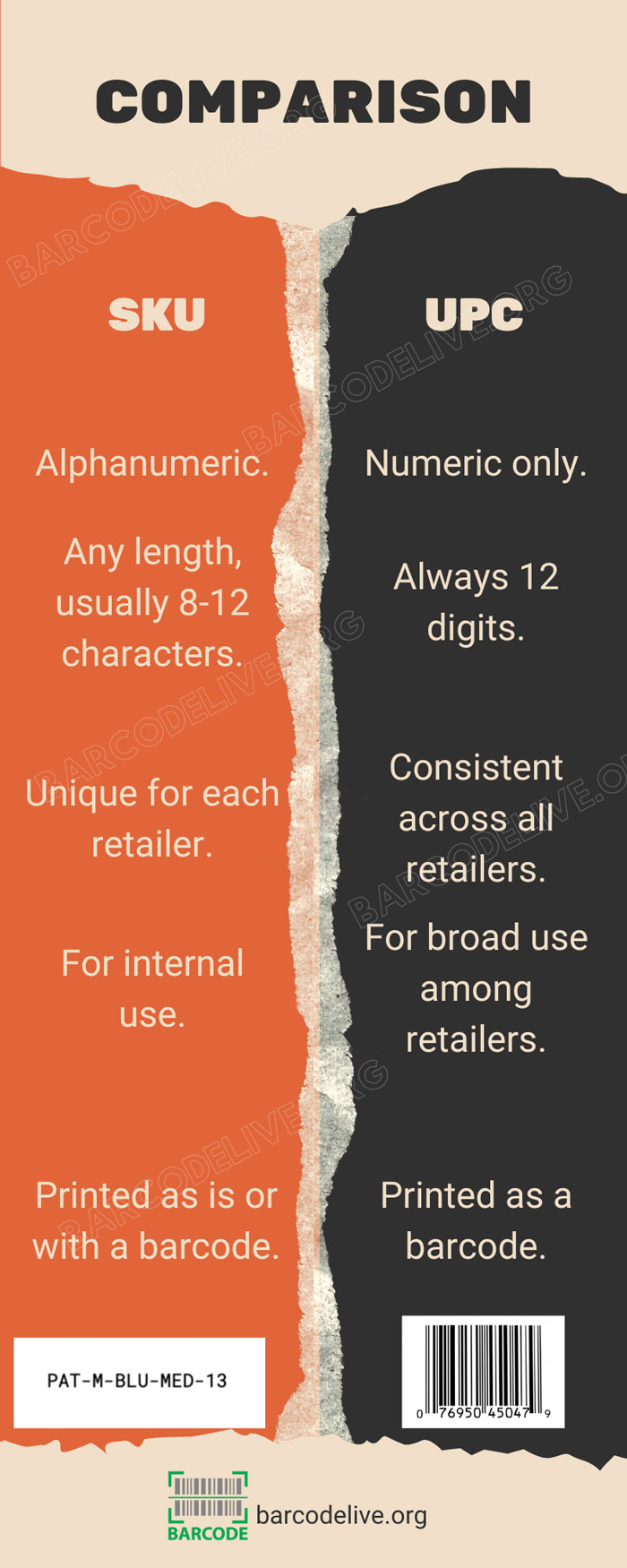
Basic comparison between SKU vs UPC
SKU vs UPC: Which One Should You Choose?
The needs of your business today and your goals for the future will determine whether your organization should employ SKUs, UPCs, or both.
SKUs are typically the best choice for DTC sales by smaller companies with fewer products.
It doesn't make sense to license a universal product code for your goods when no other parties are engaged in the sale of them.
Despite this, there are circumstances in which an SKU might be more advantageous for your company.
An SKU can first be customized for your company.
As a result, your SKU will be linked to your product online and may appear in Google search results as well.
It is therefore a useful marketing tool.
Next, an SKU enables you to track products in your store in a way that is even more personalized.
This is crucial if you have multiple iterations of your product out there. Inventory can be scanned more easily if each item has a distinct, easy-to-identify SKU.
Finally, SKUs make it simpler and faster to ring up customers at the register. For employees, an SKU is typically shorter and simpler to remember.
As a result, they can swiftly input the SKU at the register and serve consumers.
Make sure you understand the fundamental distinctions between 2 type of barcodes: UPCs and SKUs
Adhere to the recommended procedures for whichever dependable inventory management solution you use.
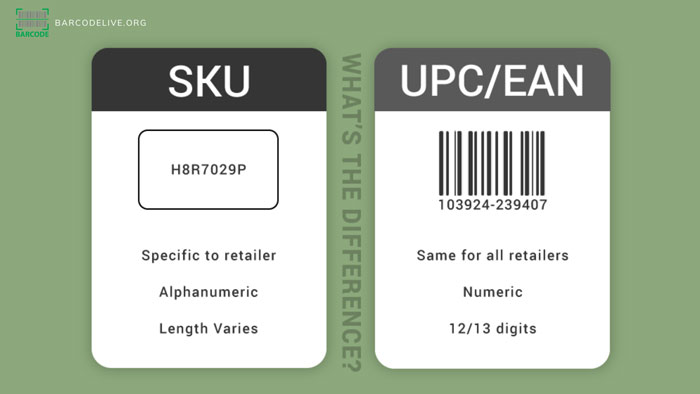
Which do you need? SKU vs UPC
How To Track SKUs And UPCs?
Tracking UPC and SKUs can be done manually, but as your business expands, automating through a POS system will improve inventory management greatly and eliminate mistakes.
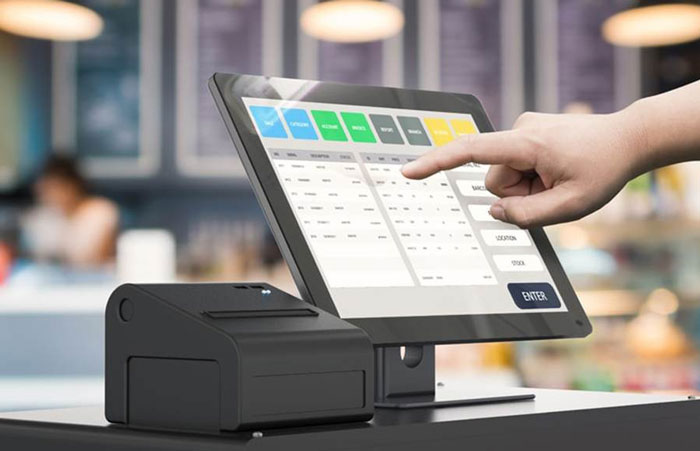
POS system
Top POS systems provide the following remedies:
-
Square for Retail: When logging new goods in the Square Dashboard, you can enter and even automatically generate product SKUs. You can print barcode labels from your Dashboard when you're ready to label your tangible products. Additionally, you can import UPC data in a CSV file or enter it in your item library.
-
Shopify: This platform features a companion program called SKUGen that can also create, manage, and print barcodes for SKUs. You can add UPC information to each of your goods individually or using a CSV file. A third-party app is also available that enables you to buy things and associate UPC numbers with them.
-
Lightspeed: This platform offers an SKU and UPC field for each item, but it does not automatically generate SKUs.
You can modify each item separately or import data using a CSV file.
-
Clover: To assist with producing SKU and UPC barcode labels, this platform also has SKU and UPC fields and interfaces with the external program Easy Labels.
Yes, you do.
An SKU is still necessary for optimal inventory management, even though a UPC system has a wider range of applications.
Since it provides you with more specific information about your products for internal item tracking.
Yes, it does.
Because a stock-keeping unit (SKU), also known as a unique identifier, is required for each product you sell in order to distinguish one from the other.
While UPCs are based exclusively on numbers and are used to identify products globally, SKU numbers are alphanumeric and used by specific merchants.
SKU numbers cannot be converted to UPCs.
However, a UPC can serve as an SKU number.
Conclusion
The primary distinction between SKUs and UPCs is that SKUs are internal, while UPCs are external. Although each has a specific purpose and in some situations, you could even be required to use a UPC, both operate in tandem to make it simple for you to manage, locate, and identify goods. Luckily, you have all the tools you need to successfully manage your inventory and sales floor when you manage your SKU vs UPC with a POS.
![Barcode Sizes Explained & FAQs: An Ultimate Guide [The Latest]](https://barcodelive.org/filemanager/data-images/imgs/20221031/Barcode-Sizes-Tutorial_1.jpg)
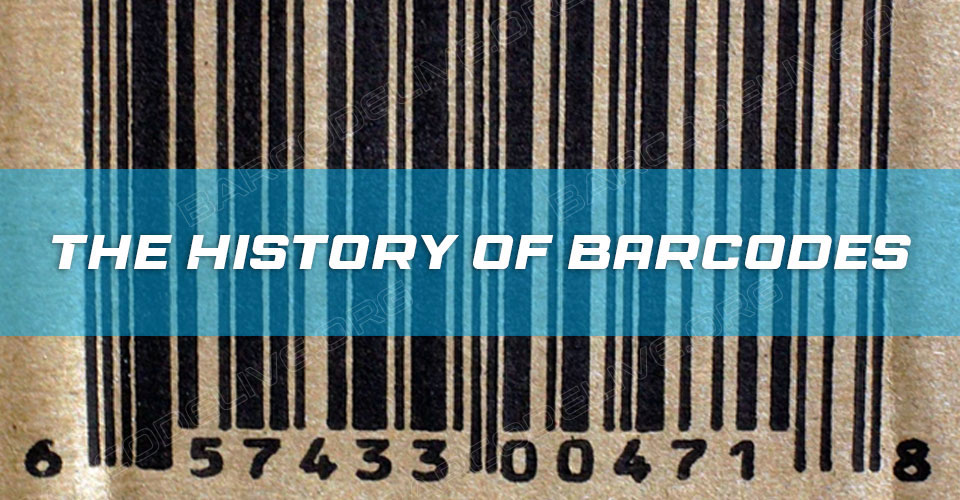
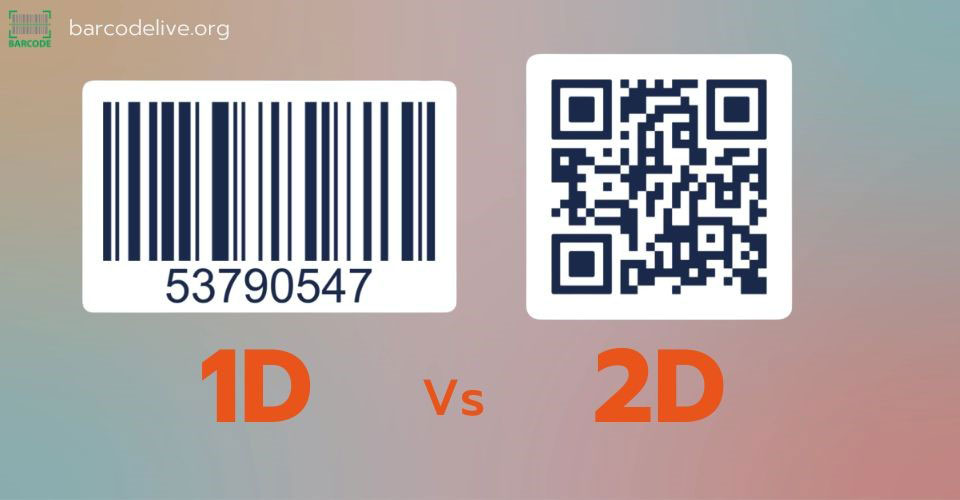
12 Comments
Senior Citizen
100✓
Leave a Comment
Your email address will not be published. Required fields are marked *Barcodelive
Great!
Leave a Comment
Your email address will not be published. Required fields are marked *Bonnie Mitchell
Are UPC codes required when listing products on Walmart?
Leave a Comment
Your email address will not be published. Required fields are marked *Barcodelive
Yes and it's mandatory to get the product published. Without UPC code products will not get published
Leave a Comment
Your email address will not be published. Required fields are marked *Isabella Thomas
Who assigns SKU number?
Leave a Comment
Your email address will not be published. Required fields are marked *Barcodelive
SKU number is defined as a set of letters and numbers given to a product by a seller
Leave a Comment
Your email address will not be published. Required fields are marked *Oscar Lee
Such a detailed post but the question here is how can I convert an SKU code list to Amazon's ASINs?
Leave a Comment
Your email address will not be published. Required fields are marked *Barcodelive
If you are selling someone else's products, that is sku's that other people are selling, that have sku numbers from that manufacturer, then they should convert automatically, at least they did once
Leave a Comment
Your email address will not be published. Required fields are marked *Luke Smith
How many digits is a SKU?
Leave a Comment
Your email address will not be published. Required fields are marked *Barcodelive
An SKU is typically eight alphanumeric digits long
Leave a Comment
Your email address will not be published. Required fields are marked *Taylor Hanson
Can I create my own UPC code for Amazon?
Leave a Comment
Your email address will not be published. Required fields are marked *Barcodelive
No, you can't. Amazon's only requirement is that you need to buy a “GS1 UPC code” to finalize your product listing and start selling on Amazon
Leave a Comment
Your email address will not be published. Required fields are marked *Leave a Comment
Your email address will not be published. Required fields are marked *